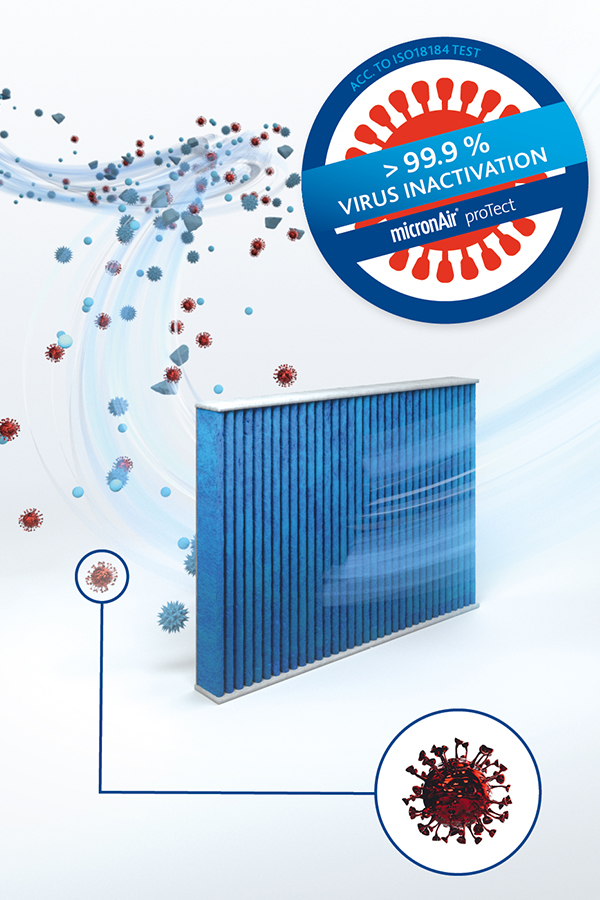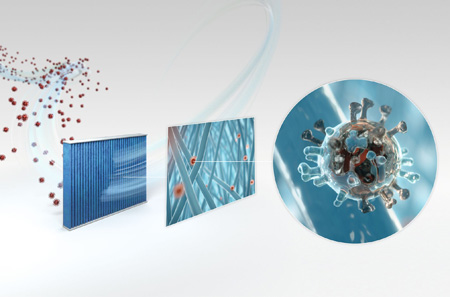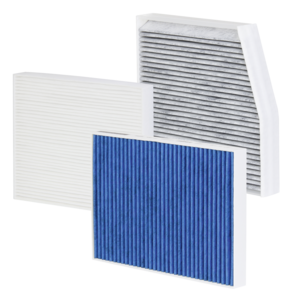Coronavirus and cabin air filtration
Protection guidelines against Covid-19 health threats
The current Covid-19 coronavirus is passed between humans in the form of aerosol particles. Although the size of these particles can vary widely depending on the person, they mostly fall within the range of 0.05 μm to 16 μm. However, the majority have been shown to be between 1.0-4.0 μm and all include a high proportion of submicron aerosol particles. Because these can be easily inhaled and absorbed by the lungs, it makes them particularly dangerous to human health. Inside vehicles, even the largest emitted virus particles will evaporate to submicron size in less than a second. This makes it vital that cabin air filters are effective right down to the 0.05 μm particle size.
Our customer information contains further details on how to protect against Covid-19 health threats.
Particle behavior inside the vehicle
Contaminated particles inside a vehicle cabin rarely pass directly into the air filtration system. Initially, they are much more likely to settle on and around the air vents or on the upholstery and other surfaces. They remain actively infectious in such places for anything from a few hours to several days.

At the same time, even if they are not passed on by touching, they will become airborne again in regular cycles as a result of wind disturbance, changing humidity levels, wiping or simply the vibration of the vehicle. In terms of air purity, it is vital that the cabin air filters are capable of separating submicron particles. Even if the infected droplets emitted by the vehicle occupants are in the larger size range, the effects of evaporation mean that the droplet sizes that eventually reach the air filter will be much smaller. For this reason, it is preferable to use the vehicle’s fresh air HVAC mode to ensure that the cabin is supplied with plentiful fresh air. This will dilute the particle concentration and reduce stress on the filter as well as rapidly evacuating virus droplets. If recirculation mode is preferred, it is essential to use the most efficient cabin air filter available to minimize the risk of transmitting the infection.
In all cases, cabin air filters should currently be changed even more often than usual to ensure maximum filter efficiency and thus protection against viruses.
micronAir testing update
We are currently conducting further tests on our filters at several institutes to validate the positive anti-virus effect against various virus types (incl. coronaviruses like Covid-19). Initial results have been extremely encouraging. We will release details as soon as the scientific evidence has been clearly established and peer reviewed.
5 recommendations for best possible Covid-19 protection:
- Use “fresh air mode” when driving whenever possible
- Install high-efficiency cabin air filters
- Install cabin air filters with the highest possible microfiber content
- Focus on stable lifetime efficiencies to avoid efficiency degradation during use
- Install micronAir proTect line cabin air filters with natural fruit extracts – these have already been shown to inactivate virtually 100 % of viruses on the surface of the filtration media (e. g. ISO18184 test showed > 99.99 % virus reduction rate for the H1N1 and HCoV-229E virus)
Join us in fighting the spread of Covid-19 to protect your customers
Cabin air filters provide added anti-viral value
Recent ISO test finds micronAir proTect line filter successfully wards off various virus types
Discover micronAir automotive cabin air filters
Highly efficient, reliable, long-lasting protection
 Language / Country
Language / Country




